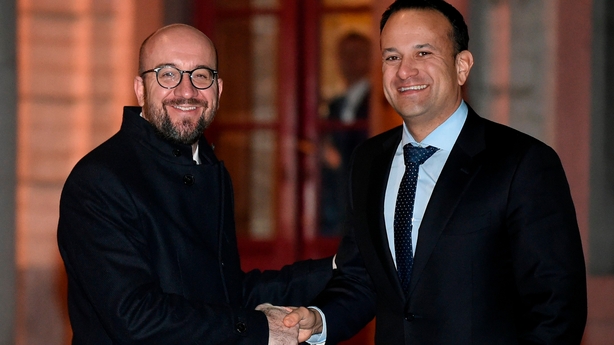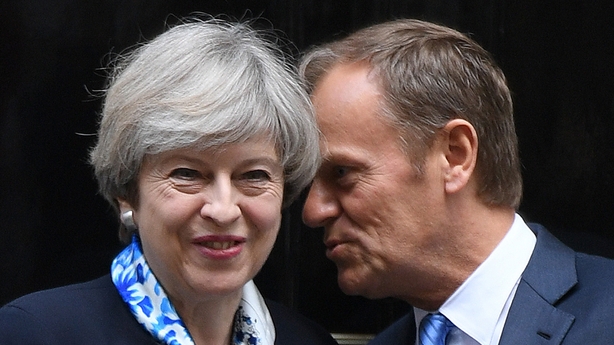The leaders of 12 European countries, including Ireland, are meeting in Brussels this evening ahead of an EU summit to discuss the future EU budget after Britain leaves.
The Belgian Prime Minster Charles Michel has invited the heads of state and government of Germany, Bulgaria, Finland, France, Ireland, Italy, Luxembourg, Poland, Portugal, Slovakia and Spain to a meeting this evening to discuss the EU budget for the seven-year period after 2020.
By then, Britain will no longer be a member of the EU - a situation that will create a €10 billion annual shortfall in the EU budget.
The leaders of all 27 EU states will meet tomorrow to begin discussions on the next EU budget, which covers the period 2021 to 2028.
The European Commission has published a report stating that Brexit will leave a hole of about €10 billion a year in the EU budget.
That and the extra demands placed on the budget as a result of decisions to do more in areas such as migration control and defence means that member states will either have to pay more into the common budget, or cut back spending on existing programmes.
European Commission President Jean-Claude Juncker said that spending cuts would fall most heavily on the EU’s two big spending areas, the Common Agriculture Policy (CAP) and the Structural and Regional funds.
In a submission to the summit meeting, the commission has called for an increase in the size of the EU budget from 1% of EU Gross National Income to somewhere between 1.1 and 1.2% of GNI.
Today, the European Parliament’s budget committee voted in favour of a resolution calling on member states to increase the size of the budget to 1.3% of GNI.
In money terms, the budget is currently €155 billion a year but this is little more than 2% of all government spending in the EU 28. Agriculture, rural development and environment spending account for 39% of this, while "economic, social and cohesion" spending gets 34% of the budget.
In a speech to the European Parliament last month, the Taoiseach said Ireland was willing to spend more on the EU budget as long as the money is to support new EU policy aims. German Chancellor Angela Merkel has also indicated a willingness to increase the EU budget size.

However, some states are concerned about the implications for their own fiscal space – the amount of additional money governments may have available for new spending commitments in their own countries if the EU budget is enlarged – requiring bigger contributions from member states.
A group of states, notably the Netherlands, Denmark and Finland, are strongly against an increase in the size of the budget.
Tomorrow’s summit of 27 will have an initial discussion on the budget, with the Council President Donald Tusk asking leaders to say what political priorities should be addressed in the budget
Britain is not attending because it will be dealing with issues that only come into play after Britain is gone from the EU.
Mr Tusk will ask the leaders what they think the overall level of spending should be, and how fast they should try to wrap up a budget deal, whether they should aim to get a deal before next year’s European Parliament elections, or wait until afterwards.
The Government thinks a longer timeframe would be better, as there would be greater clarity on the final Brexit package, including any possible areas that Britain would opt into after Brexit and pay for.
It will also discuss some institutional issues, notably what to do with the 73 European Parliament seats currently allocated to the UK. Most countries feel that a smaller number of member states justifies a smaller number of MEPs, but French President Emmanuel Macron has suggested using the former British seats to establish a "trans-national" constituency in which all EU citizens can vote for party lists.
However, this would require legislative changes, which Mr Tusk says are not feasible in the timeframe before next year’s elections.
The European Parliament itself voted against having a transnational list. Instead, it has called for 27 of the seats to be allocated to existing member states, with the remainder held in reserve in case of future enlargements. Under this arrangement, Ireland would gain two additional MEPs.
In a related matter, the leaders are due to discuss the method for selecting the President of the European Commission.
At the last European Parliament election states tacitly agreed to appoint the "list leader" of the party with the most seats in the elections as the President of the Commission.
However, the idea was unpopular with some governments, and is legally controversial, as under the EU treaties the choice of Commission President lies with the leaders’ summit, not the European Parliament.

At the end of tomorrow’s summit, Mr Tusk will brief leaders on how he intends to prepare draft Brexit guidelines on the future relationship between the UK and the EU, which are due to be approved at a summit next month.
Earlier today, the Taoiseach said the UK can have as close a relationship with the EU as it wants to have, but it cannot cherry-pick what parts of the single market it will or will not be involved in, or if it will accept some EU rules and regulations but not others.
This follows a comprehensive rejection by the European Commission’s Article 50 task force of Theresa May’s suggestion of a so called "three-basket" approach to Britain’s future relationship with the single market, under which Britain proposed that it would stick to single market rules for some areas of trade, would set its own rules but stay closely aligned to the EU in other areas, and in a third category would diverge sharply from EU rules and practice.
The Commission said this approach was not compatible with negotiating guidelines agreed by the other 27 EU governments almost a year ago.
At an Irish Independent breakfast event this morning, the Taoiseach said he expected the draft text of the treaty setting out Britain’s terms of withdrawal from the EU in about two weeks’ time.
Mr Varadkar said the transition phase that is due to follow on from that is conditional on the withdrawal treaty, and if there is no withdrawal treaty there can be no transition phase.
He said the withdrawal treaty must satisfy all 27 governments, and the Government is insisting it contain, in legally binding form, the commitments agreed in principle in December concerning Northern Ireland.
He said once the withdrawal treaty and transition period are agreed, the parties can move on to the issue of the future relationship. He repeated the Government view that it wishes to see the closest possible relationship, with as little divergence from the current arrangements as possible.
But he said "now that the UK has said its leaving the single market and the customs union, it makes that very difficult".
He said the future relationship with the EU will probably come in the form of two separate treaties.
One will deal with security and defence issues, and he said there was a great willingness to have such a treaty with the UK, as it "punches above its weight" in terms of its contribution to European security and defence.
However, the second treaty will cover trade matters, and he said that would be "more difficult".






